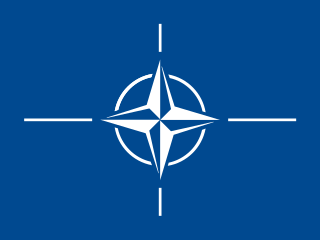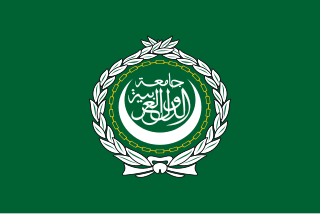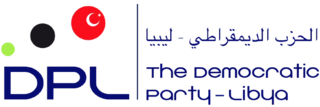
The North Atlantic Treaty Organization, also called the North Atlantic Alliance, is an intergovernmental military alliance between 29 North American and European countries. The organization implements the North Atlantic Treaty that was signed on 4 April 1949. NATO constitutes a system of collective defence whereby its independent member states agree to mutual defence in response to an attack by any external party. NATO’s Headquarters are located in Haren, Brussels, Belgium, while the headquarters of Allied Command Operations is near Mons, Belgium.

The Arab League, formally the League of Arab States, is a regional organization of Arab states in and around North Africa, the Horn of Africa and Arabia. It was formed in Cairo on 22 March 1945 with six members: Egypt, Iraq, Transjordan, Lebanon, Saudi Arabia, and Syria. Yemen joined as a member on 5 May 1945. Currently, the League has 22 members, but Syria's participation has been suspended since November 2011, as a consequence of government repression during the Syrian Civil War.

Muammar Mohammed Abu Minyar Gaddafi, commonly known as Colonel Gaddafi, was a Libyan revolutionary, politician, and political theorist. He governed Libya as Revolutionary Chairman of the Libyan Arab Republic from 1969 to 1977, and then as the "Brotherly Leader" of the Great Socialist People's Libyan Arab Jamahiriya from 1977 to 2011. He was initially ideologically committed to Arab nationalism and Arab socialism but later ruled according to his own Third International Theory.

Muammar Gaddafi became the de facto leader of Libya on 1 September 1969 after leading a group of young Libyan military officers against King Idris I in a bloodless coup d'état. After the king had fled the country, the Libyan Revolutionary Command Council (RCC) headed by Gaddafi abolished the monarchy and the old constitution and established the Libyan Arab Republic, with the motto "freedom, socialism and unity".

The Libyan–Egyptian War was a short border war between Libya and Egypt in July 1977.

Pakistan continues to enjoy a privileged status in the Organisation of Islamic Cooperation. In terms of population, it is the OIC's second largest member. Being the only Muslim country with nuclear weapons, having the seventh-largest standing military force, through research at NESCOM and DESTO and a large labour workforce working in various Muslim countries, play a role in its prominence.

The Arab League has 22 member states. It was founded in Cairo in March 1945 with six members: the Kingdom of Egypt, Kingdom of Iraq, Lebanon, Saudi Arabia, Syrian Republic, and Transjordan. North Yemen joined on 5 May 1945. Membership increased during the second half of the 20th century. Five countries have observer status.

The First Libyan Civil War, also referred to as the Libyan Revolution or 17 February Revolution, was an armed conflict in 2011 in the North African country of Libya fought between forces loyal to Colonel Muammar Gaddafi and those seeking to oust his government. The war was preceded by protests in Zawiya on 8 August 2009 and finally ignited by protests in Benghazi beginning on Tuesday, 15 February 2011, which led to clashes with security forces that fired on the crowd. The protests escalated into a rebellion that spread across the country, with the forces opposing Gaddafi establishing an interim governing body, the National Transitional Council.
The international reactions to the Libyan Civil War were the responses to the series of protests and military confrontations occurring in Libya against the government of Libya and its de facto head of state Muammar Gaddafi.

The National Transitional Council of Libya, sometimes known as the Transitional National Council, was the de facto government of Libya for a period during and after the Libyan Civil War, in which rebel forces overthrew the Libyan Arab Jamahiriya of Muammar Gaddafi. The NTC governed Libya for a period of ten months after the end of the war, holding elections to a General National Congress on 7 July 2012, and handing power to the newly elected assembly on 8 August.

On 19 March 2011, a multi-state NATO-led coalition began a military intervention in Libya, ostensibly to implement United Nations Security Council Resolution 1973. The United Nations Intent and Voting was to have "an immediate ceasefire in Libya, including an end to the current attacks against civilians, which it said might constitute crimes against humanity ... imposing a ban on all flights in the country's airspace – a no-fly zone – and tightened sanctions on the Gaddafi regime and its supporters." The resolution was taken in response to events during the Libyan Civil War, and military operations began, with American and British naval forces firing over 110 Tomahawk cruise missiles, the French Air Force, British Royal Air Force, and Royal Canadian Air Force undertaking sorties across Libya and a naval blockade by Coalition forces. French jets launched air strikes against Libyan Army tanks and vehicles. The Libyan government response to the campaign was totally ineffectual, with Gaddafi's forces not managing to shoot down a single NATO plane despite the country possessing 30 heavy SAM batteries, 17 medium SAM batteries, 55 light SAM batteries, and 440–600 short-ranged air-defense guns. The official names for the interventions by the coalition members are Opération Harmattan by France; Operation Ellamy by the United Kingdom; Operation Mobile for the Canadian participation and Operation Odyssey Dawn for the United States. Italy initially opposed the intervention but then offered to take part in the operations on the condition that NATO took the leadership of the mission instead of individual countries. As this condition was later met, Italy shared its bases and intelligence with the allies.
The 17th Ordinary African Union Summit was held 28 June 2011 through 1 July 2011 in Malabo, the capital city of the Equatorial Guinea. In addition to the meeting of AU heads of state, the AU summit in Malabo included the 19th Ordinary Session of the Executive Council and the 22nd Ordinary Session of the Permanent Representatives Committee (PRC).

The foreign relations of Libya were largely reset at the end of the Libyan Civil War, with the overthrow of Muammar Gaddafi and the ongoing Second Libyan Civil War. The current Minister of Foreign Affairs in the internationally recognized executive government known as the Government of National Accord (GNA) is Mohamed Taha Siala. Although many foreign embassies in Tripoli closed down in 2014 due to the fighting, by the end of 2017 thirty diplomatic missions were reopened in the Libyan capital.
The Friends of Libya group was an international collective established to support the Libyan National Transitional Council in their effort to overthrow the regime of Muammar Gaddafi in Libya. It was hosted by western nations and members of the Arab League, and known by a variety of other names including the Libya Contact Group and the International Contact Group for Libya.

The Democratic Party in Libya is a political party launched by the Libyan Freedom and Democracy Campaign on 14 July 2011 to represent the aspirations of the Libyan people in post-Gaddafi and post-National Transitional Council elections.

India–Libya relations are bilateral diplomatic relations between India and Libya. India maintains an embassy in Tripoli and Libya has an embassy in New Delhi.

The Libyan Crisis refers to the ongoing conflicts in Libya, beginning with the Arab Spring protests of 2011, which led to a civil war, foreign military intervention, and the ousting and death of Muammar Gaddafi. The civil war's aftermath and proliferation of armed groups led to violence and instability across the country, which erupted into renewed civil war in 2014. The ongoing crisis in Libya has so far resulted in tens of thousands of casualties since the onset of violence in early 2011. During both civil wars, the output of Libya's economically crucial oil industry collapsed to a small fraction of its usual level, with most facilities blockaded or damaged by rival groups, despite having the largest oil reserves of any African country. U.S. President Barack Obama stated on 11 April 2016 that not preparing for a post-Gaddafi Libya was probably the "worst mistake" of his presidency.
The following lists events that happened during 2007 in Libya.

















